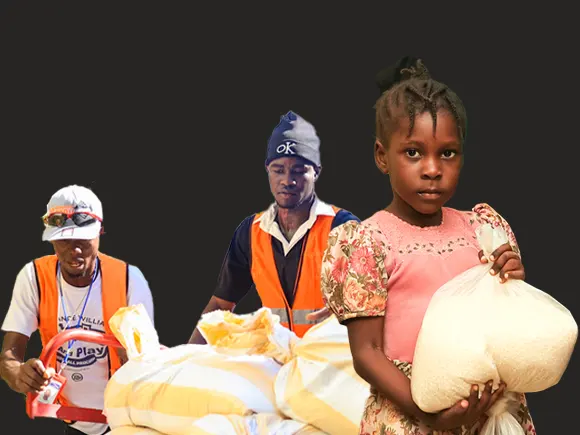Food For The Poor Remains Persistent in Haiti’s Recovery Effort
COCONUT CREEK, Fla. (June 8, 2015) – Food For The Poor, which began working in Haiti in 1986, promised to remain with the people of Haiti on their long road to recovery after the January 2010 earthquake– and the charity is living up to that commitment.
Since the 7.0 magnitude earthquake, Food For The Poor has:
- Built 5,633 permanent two-room concrete block homes with a water-holding cistern. There’s also a sanitation component, which consists of a bathroom with a flush toilet, sink and shower. Each house has a kitchenette that includes a water catchment system, a front porch and solar lights. These homes are providing more than 33,700 people with a safe and secure place to live. An average Haitian household consists of six family members.
- Installed 90 water filtration units that purify 900,000 gallons of clean water a day, which equates to 180,000 individuals who now have access to clean water.
- Drilled 372 wells and pumps, providing more than 1.1 million people with clean water each day.
- Built or restored 35 schools in the Port-au-Prince area, which have an enrollment of 12,173 students.
- Shipped 5,543 containers, which include rice, sardines, beans, rice/soy meals, medicine, medical supplies, school and dorm furniture, tile, shoes, hygiene items, household items, cleaning supplies, and construction supplies.
“The fifth anniversary of the earthquake should serve as a reminder of the sheer will of the human spirit to survive. The people of Haiti have had their share of natural disasters, yet they refuse to give up. And this organization will not give up on them,” said Robin Mahfood, President/CEO of Food For The Poor. “The rebuilding of Haiti is not going to be a quick fix, so we will continue on our path, which is to help one family and one village at a time.”
At 4:53 p.m. on Jan. 12, 2010, a sudden shift in a fault triggered a catastrophic 7.0 magnitude earthquake near Haiti’s bustling capital of Port-au-Prince. More than 250,000 people were killed that day and an estimated 1.3 million were left homeless.
According to the International Organization for Migration, as of June 2015, more than 64,600 people are living in 66 camps scattered throughout the Port-au-Prince region. Helping people to get out of the dangerous conditions of living in tent cities remains a priority of Food For The Poor, as it helps families to renew their lives.
Food For The Poor, named by The Chronicle of Philanthropy as the largest international relief and development organization in the nation, does much more than feed millions of the hungry poor in 17 countries of the Caribbean and Latin America. This interdenominational Christian ministry provides emergency relief assistance, clean water, medicines, educational materials, homes, support for orphans and the aged, skills training and micro-enterprise development assistance, with more than 95 percent of all donations going directly to programs that help the poor. For more information, please visit www.FoodForThePoor.org.
Wanda Wright
Food For The Poor
Public Relations
954-427-2222 x 6079
wandaw@foodforthepoor.com
